Evidence-Based Practice in Healthcare: Research Report Analysis
VerifiedAdded on 2022/12/27
|10
|2819
|28
Report
AI Summary
This report examines the fundamentals of evidence-based practice (EBP) in health and social care. It begins by defining EBP as the integration of research evidence, clinical expertise, and patient values to improve patient outcomes. The report explores the purpose and process of conducting research within EBP, emphasizing the importance of evaluating evidence and applying it clinically. It highlights the advantages of EBP, such as improved patient outcomes and reduced healthcare costs. The report then delves into the skills and qualities required for conducting literature reviews, outlining the process of searching for, evaluating, and synthesizing information from various sources. It describes different types of sources, including primary, secondary, and tertiary sources, and discusses the goals of literature reviews in informing healthcare decisions and identifying research gaps. Finally, the report explains the results of literature research, emphasizing key components and methods used to develop evidence-based guidelines. Overall, the report underscores the significance of EBP in enhancing clinical practices and achieving positive patient outcomes.
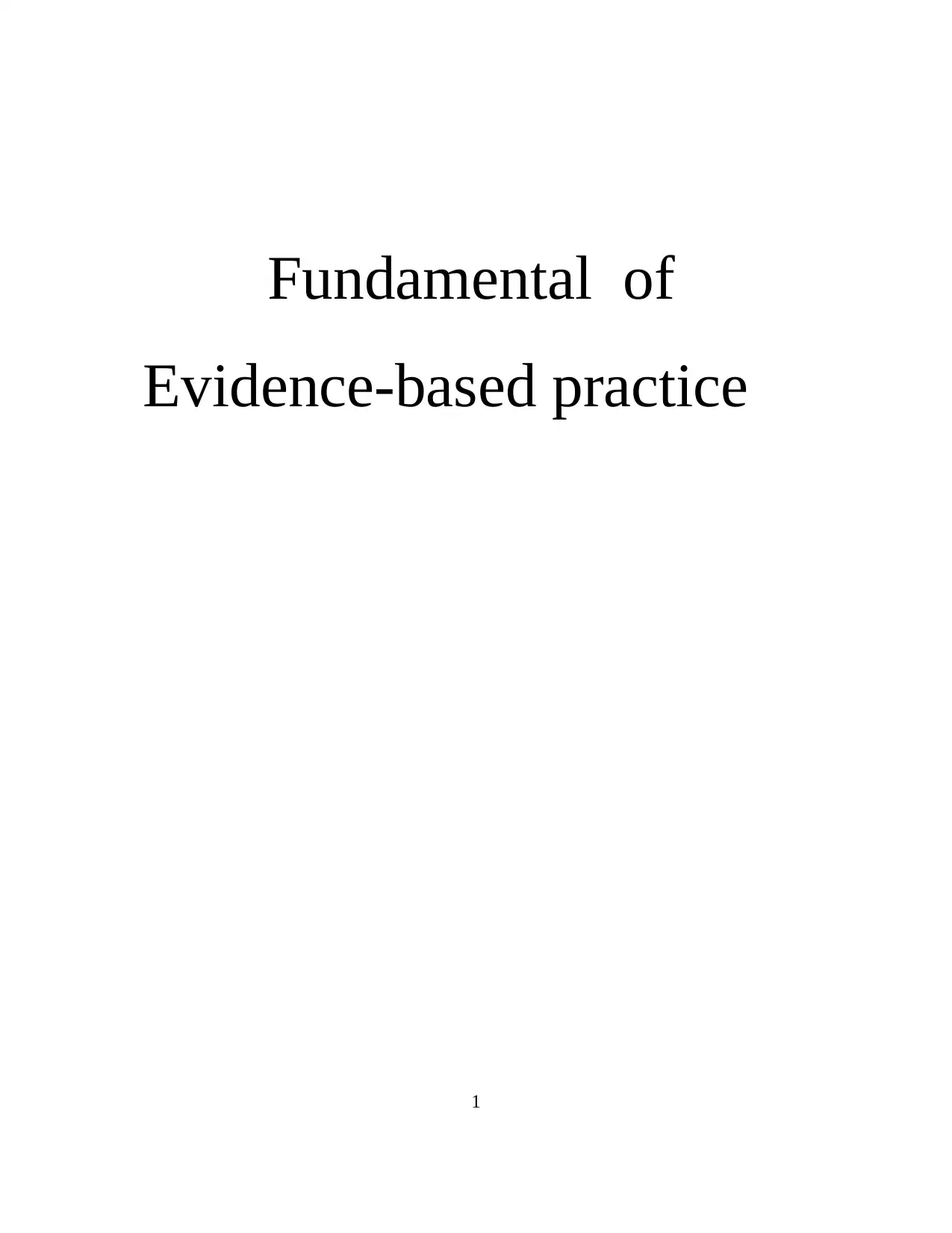
Fundamental of
Evidence-based practice
1
Evidence-based practice
1
Paraphrase This Document
Need a fresh take? Get an instant paraphrase of this document with our AI Paraphraser
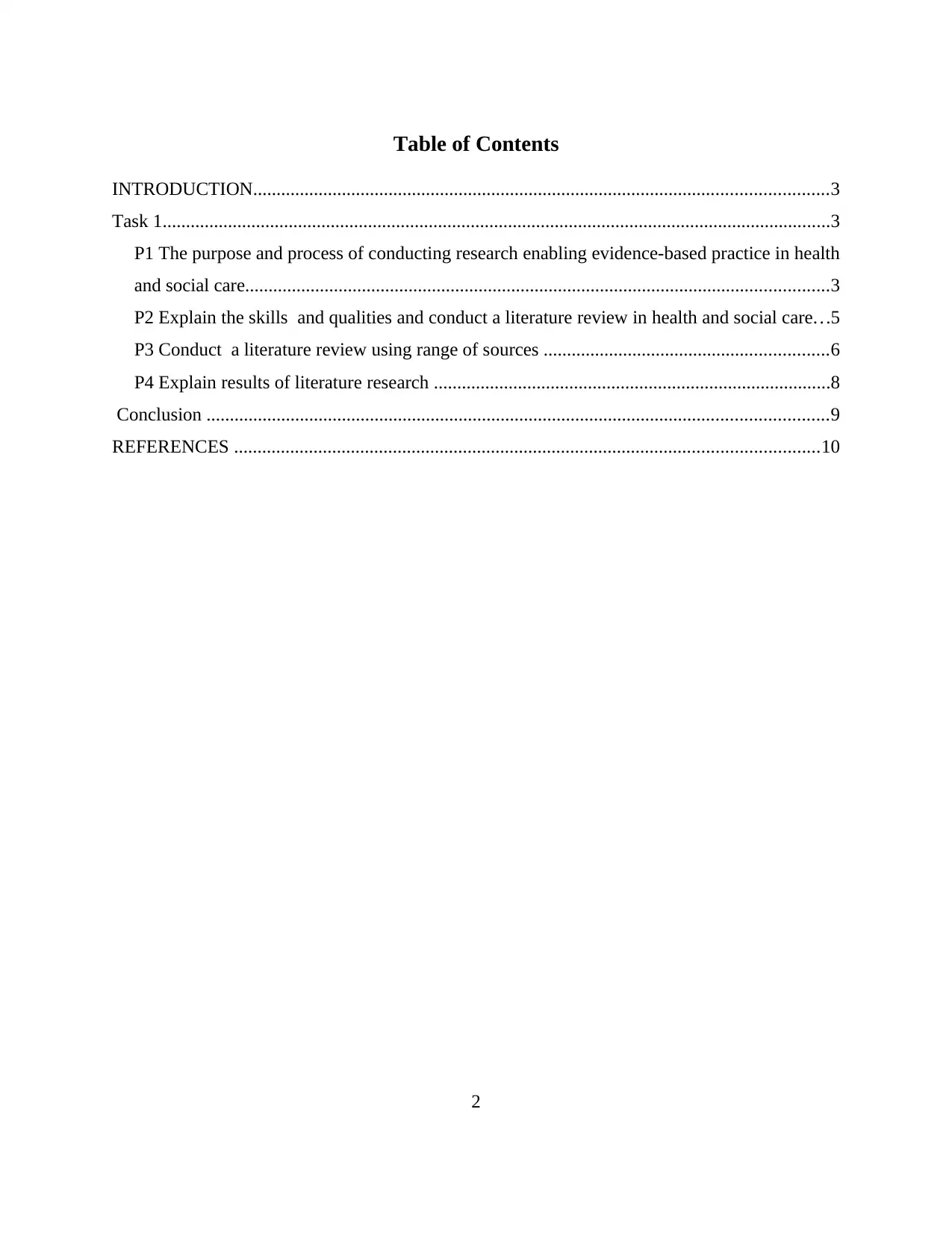
Table of Contents
INTRODUCTION...........................................................................................................................3
Task 1...............................................................................................................................................3
P1 The purpose and process of conducting research enabling evidence-based practice in health
and social care.............................................................................................................................3
P2 Explain the skills and qualities and conduct a literature review in health and social care...5
P3 Conduct a literature review using range of sources .............................................................6
P4 Explain results of literature research .....................................................................................8
Conclusion .....................................................................................................................................9
REFERENCES .............................................................................................................................10
2
INTRODUCTION...........................................................................................................................3
Task 1...............................................................................................................................................3
P1 The purpose and process of conducting research enabling evidence-based practice in health
and social care.............................................................................................................................3
P2 Explain the skills and qualities and conduct a literature review in health and social care...5
P3 Conduct a literature review using range of sources .............................................................6
P4 Explain results of literature research .....................................................................................8
Conclusion .....................................................................................................................................9
REFERENCES .............................................................................................................................10
2
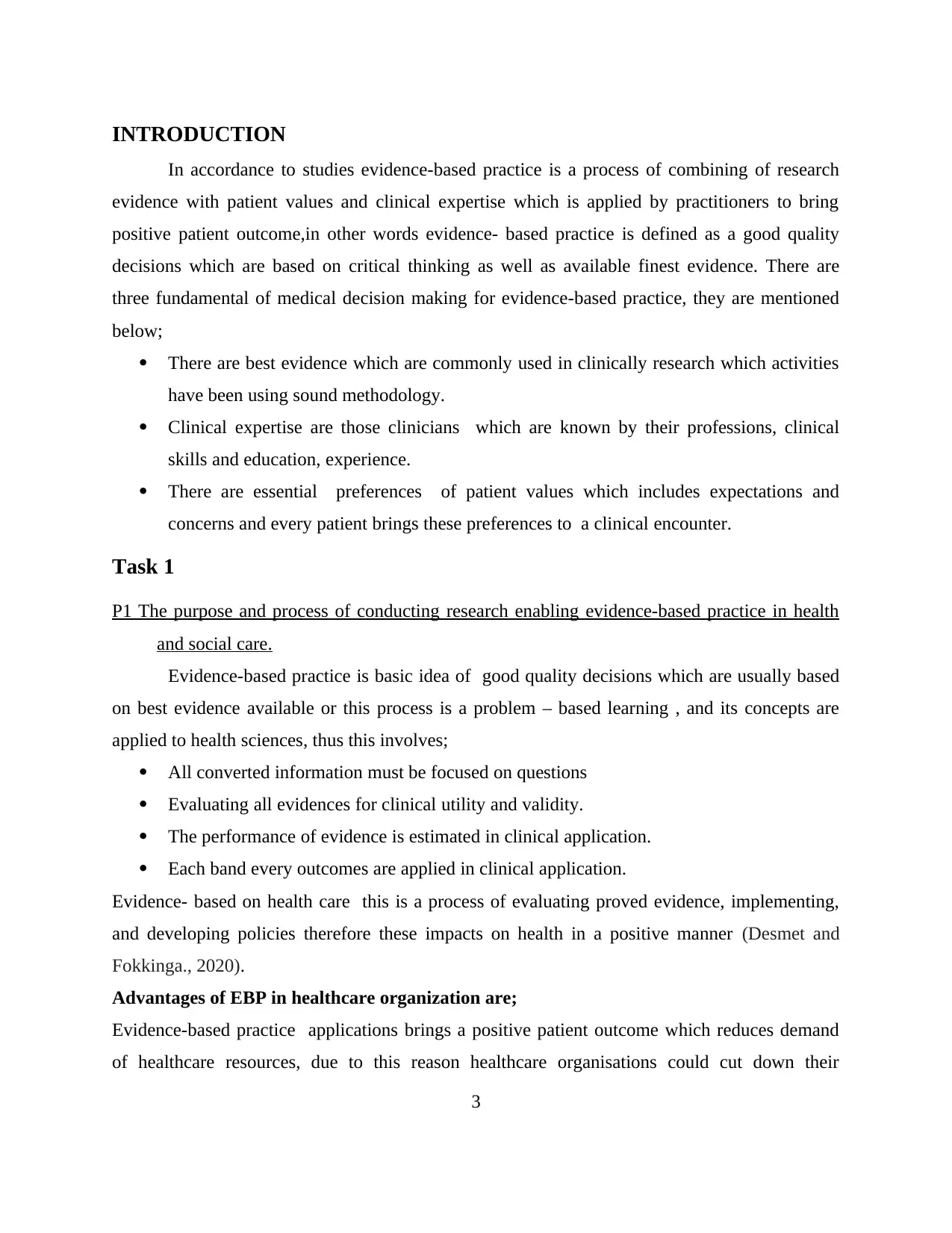
INTRODUCTION
In accordance to studies evidence-based practice is a process of combining of research
evidence with patient values and clinical expertise which is applied by practitioners to bring
positive patient outcome,in other words evidence- based practice is defined as a good quality
decisions which are based on critical thinking as well as available finest evidence. There are
three fundamental of medical decision making for evidence-based practice, they are mentioned
below;
There are best evidence which are commonly used in clinically research which activities
have been using sound methodology.
Clinical expertise are those clinicians which are known by their professions, clinical
skills and education, experience.
There are essential preferences of patient values which includes expectations and
concerns and every patient brings these preferences to a clinical encounter.
Task 1
P1 The purpose and process of conducting research enabling evidence-based practice in health
and social care.
Evidence-based practice is basic idea of good quality decisions which are usually based
on best evidence available or this process is a problem – based learning , and its concepts are
applied to health sciences, thus this involves;
All converted information must be focused on questions
Evaluating all evidences for clinical utility and validity.
The performance of evidence is estimated in clinical application.
Each band every outcomes are applied in clinical application.
Evidence- based on health care this is a process of evaluating proved evidence, implementing,
and developing policies therefore these impacts on health in a positive manner (Desmet and
Fokkinga., 2020).
Advantages of EBP in healthcare organization are;
Evidence-based practice applications brings a positive patient outcome which reduces demand
of healthcare resources, due to this reason healthcare organisations could cut down their
3
In accordance to studies evidence-based practice is a process of combining of research
evidence with patient values and clinical expertise which is applied by practitioners to bring
positive patient outcome,in other words evidence- based practice is defined as a good quality
decisions which are based on critical thinking as well as available finest evidence. There are
three fundamental of medical decision making for evidence-based practice, they are mentioned
below;
There are best evidence which are commonly used in clinically research which activities
have been using sound methodology.
Clinical expertise are those clinicians which are known by their professions, clinical
skills and education, experience.
There are essential preferences of patient values which includes expectations and
concerns and every patient brings these preferences to a clinical encounter.
Task 1
P1 The purpose and process of conducting research enabling evidence-based practice in health
and social care.
Evidence-based practice is basic idea of good quality decisions which are usually based
on best evidence available or this process is a problem – based learning , and its concepts are
applied to health sciences, thus this involves;
All converted information must be focused on questions
Evaluating all evidences for clinical utility and validity.
The performance of evidence is estimated in clinical application.
Each band every outcomes are applied in clinical application.
Evidence- based on health care this is a process of evaluating proved evidence, implementing,
and developing policies therefore these impacts on health in a positive manner (Desmet and
Fokkinga., 2020).
Advantages of EBP in healthcare organization are;
Evidence-based practice applications brings a positive patient outcome which reduces demand
of healthcare resources, due to this reason healthcare organisations could cut down their
3
⊘ This is a preview!⊘
Do you want full access?
Subscribe today to unlock all pages.

Trusted by 1+ million students worldwide
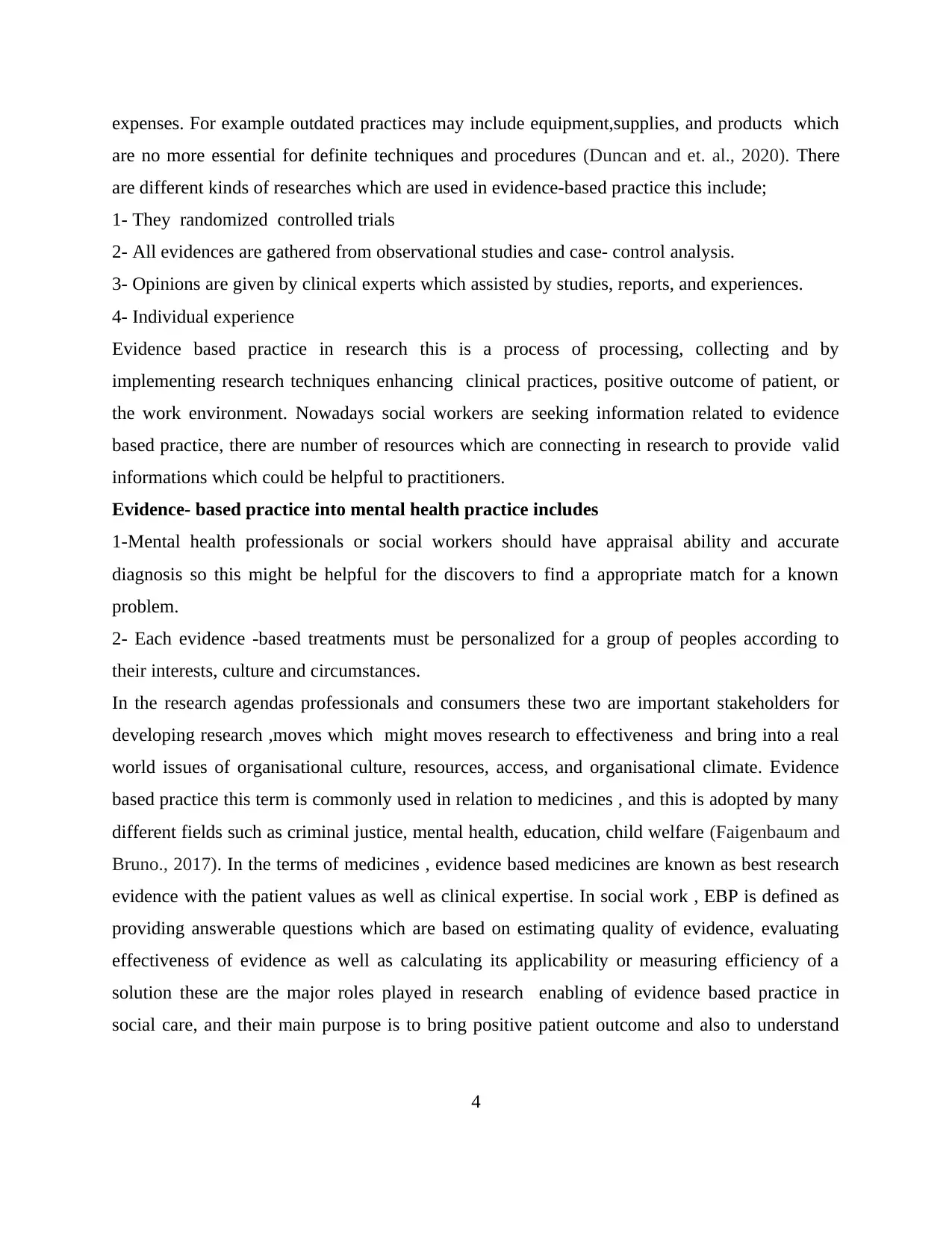
expenses. For example outdated practices may include equipment,supplies, and products which
are no more essential for definite techniques and procedures (Duncan and et. al., 2020). There
are different kinds of researches which are used in evidence-based practice this include;
1- They randomized controlled trials
2- All evidences are gathered from observational studies and case- control analysis.
3- Opinions are given by clinical experts which assisted by studies, reports, and experiences.
4- Individual experience
Evidence based practice in research this is a process of processing, collecting and by
implementing research techniques enhancing clinical practices, positive outcome of patient, or
the work environment. Nowadays social workers are seeking information related to evidence
based practice, there are number of resources which are connecting in research to provide valid
informations which could be helpful to practitioners.
Evidence- based practice into mental health practice includes
1-Mental health professionals or social workers should have appraisal ability and accurate
diagnosis so this might be helpful for the discovers to find a appropriate match for a known
problem.
2- Each evidence -based treatments must be personalized for a group of peoples according to
their interests, culture and circumstances.
In the research agendas professionals and consumers these two are important stakeholders for
developing research ,moves which might moves research to effectiveness and bring into a real
world issues of organisational culture, resources, access, and organisational climate. Evidence
based practice this term is commonly used in relation to medicines , and this is adopted by many
different fields such as criminal justice, mental health, education, child welfare (Faigenbaum and
Bruno., 2017). In the terms of medicines , evidence based medicines are known as best research
evidence with the patient values as well as clinical expertise. In social work , EBP is defined as
providing answerable questions which are based on estimating quality of evidence, evaluating
effectiveness of evidence as well as calculating its applicability or measuring efficiency of a
solution these are the major roles played in research enabling of evidence based practice in
social care, and their main purpose is to bring positive patient outcome and also to understand
4
are no more essential for definite techniques and procedures (Duncan and et. al., 2020). There
are different kinds of researches which are used in evidence-based practice this include;
1- They randomized controlled trials
2- All evidences are gathered from observational studies and case- control analysis.
3- Opinions are given by clinical experts which assisted by studies, reports, and experiences.
4- Individual experience
Evidence based practice in research this is a process of processing, collecting and by
implementing research techniques enhancing clinical practices, positive outcome of patient, or
the work environment. Nowadays social workers are seeking information related to evidence
based practice, there are number of resources which are connecting in research to provide valid
informations which could be helpful to practitioners.
Evidence- based practice into mental health practice includes
1-Mental health professionals or social workers should have appraisal ability and accurate
diagnosis so this might be helpful for the discovers to find a appropriate match for a known
problem.
2- Each evidence -based treatments must be personalized for a group of peoples according to
their interests, culture and circumstances.
In the research agendas professionals and consumers these two are important stakeholders for
developing research ,moves which might moves research to effectiveness and bring into a real
world issues of organisational culture, resources, access, and organisational climate. Evidence
based practice this term is commonly used in relation to medicines , and this is adopted by many
different fields such as criminal justice, mental health, education, child welfare (Faigenbaum and
Bruno., 2017). In the terms of medicines , evidence based medicines are known as best research
evidence with the patient values as well as clinical expertise. In social work , EBP is defined as
providing answerable questions which are based on estimating quality of evidence, evaluating
effectiveness of evidence as well as calculating its applicability or measuring efficiency of a
solution these are the major roles played in research enabling of evidence based practice in
social care, and their main purpose is to bring positive patient outcome and also to understand
4
Paraphrase This Document
Need a fresh take? Get an instant paraphrase of this document with our AI Paraphraser
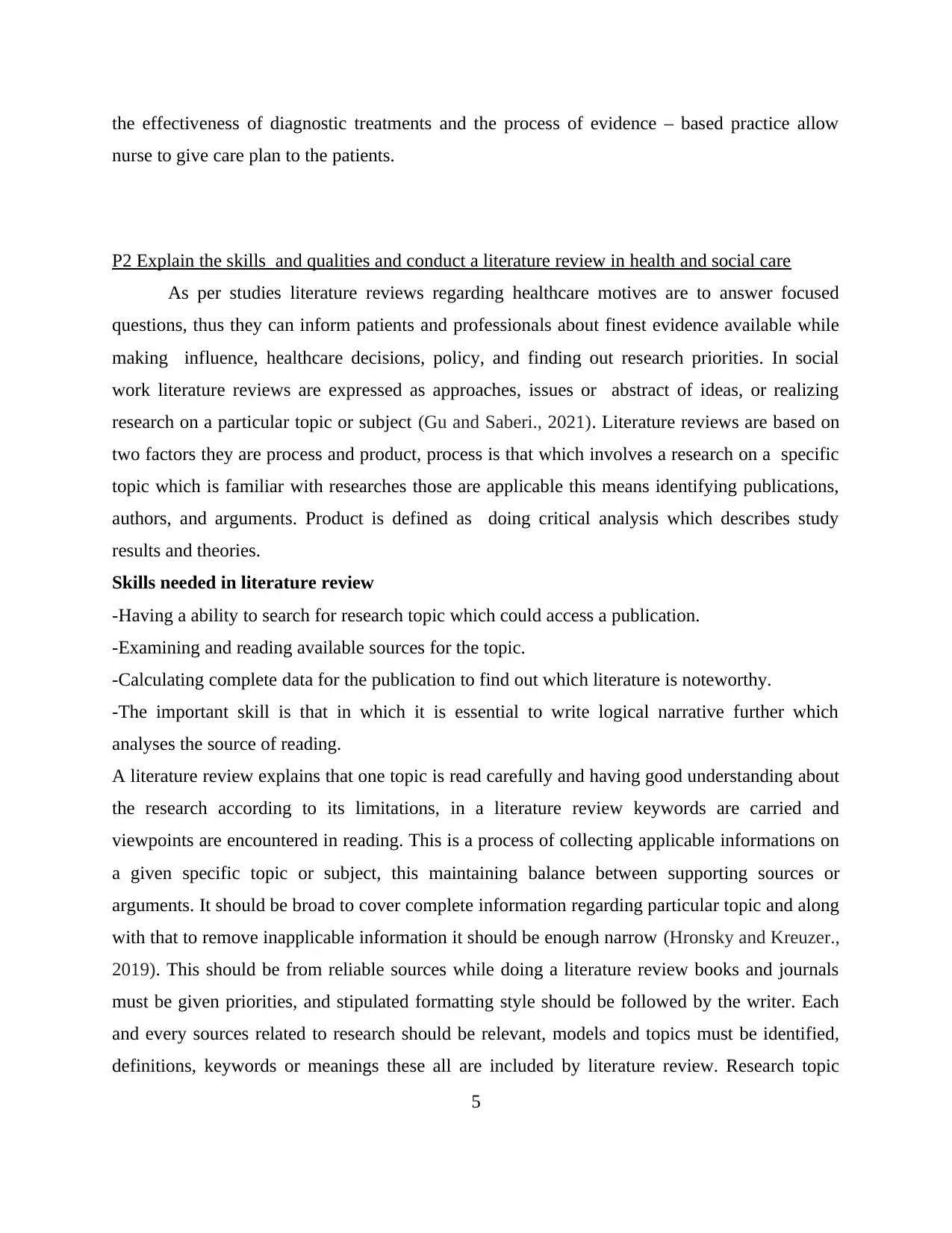
the effectiveness of diagnostic treatments and the process of evidence – based practice allow
nurse to give care plan to the patients.
P2 Explain the skills and qualities and conduct a literature review in health and social care
As per studies literature reviews regarding healthcare motives are to answer focused
questions, thus they can inform patients and professionals about finest evidence available while
making influence, healthcare decisions, policy, and finding out research priorities. In social
work literature reviews are expressed as approaches, issues or abstract of ideas, or realizing
research on a particular topic or subject (Gu and Saberi., 2021). Literature reviews are based on
two factors they are process and product, process is that which involves a research on a specific
topic which is familiar with researches those are applicable this means identifying publications,
authors, and arguments. Product is defined as doing critical analysis which describes study
results and theories.
Skills needed in literature review
-Having a ability to search for research topic which could access a publication.
-Examining and reading available sources for the topic.
-Calculating complete data for the publication to find out which literature is noteworthy.
-The important skill is that in which it is essential to write logical narrative further which
analyses the source of reading.
A literature review explains that one topic is read carefully and having good understanding about
the research according to its limitations, in a literature review keywords are carried and
viewpoints are encountered in reading. This is a process of collecting applicable informations on
a given specific topic or subject, this maintaining balance between supporting sources or
arguments. It should be broad to cover complete information regarding particular topic and along
with that to remove inapplicable information it should be enough narrow (Hronsky and Kreuzer.,
2019). This should be from reliable sources while doing a literature review books and journals
must be given priorities, and stipulated formatting style should be followed by the writer. Each
and every sources related to research should be relevant, models and topics must be identified,
definitions, keywords or meanings these all are included by literature review. Research topic
5
nurse to give care plan to the patients.
P2 Explain the skills and qualities and conduct a literature review in health and social care
As per studies literature reviews regarding healthcare motives are to answer focused
questions, thus they can inform patients and professionals about finest evidence available while
making influence, healthcare decisions, policy, and finding out research priorities. In social
work literature reviews are expressed as approaches, issues or abstract of ideas, or realizing
research on a particular topic or subject (Gu and Saberi., 2021). Literature reviews are based on
two factors they are process and product, process is that which involves a research on a specific
topic which is familiar with researches those are applicable this means identifying publications,
authors, and arguments. Product is defined as doing critical analysis which describes study
results and theories.
Skills needed in literature review
-Having a ability to search for research topic which could access a publication.
-Examining and reading available sources for the topic.
-Calculating complete data for the publication to find out which literature is noteworthy.
-The important skill is that in which it is essential to write logical narrative further which
analyses the source of reading.
A literature review explains that one topic is read carefully and having good understanding about
the research according to its limitations, in a literature review keywords are carried and
viewpoints are encountered in reading. This is a process of collecting applicable informations on
a given specific topic or subject, this maintaining balance between supporting sources or
arguments. It should be broad to cover complete information regarding particular topic and along
with that to remove inapplicable information it should be enough narrow (Hronsky and Kreuzer.,
2019). This should be from reliable sources while doing a literature review books and journals
must be given priorities, and stipulated formatting style should be followed by the writer. Each
and every sources related to research should be relevant, models and topics must be identified,
definitions, keywords or meanings these all are included by literature review. Research topic
5
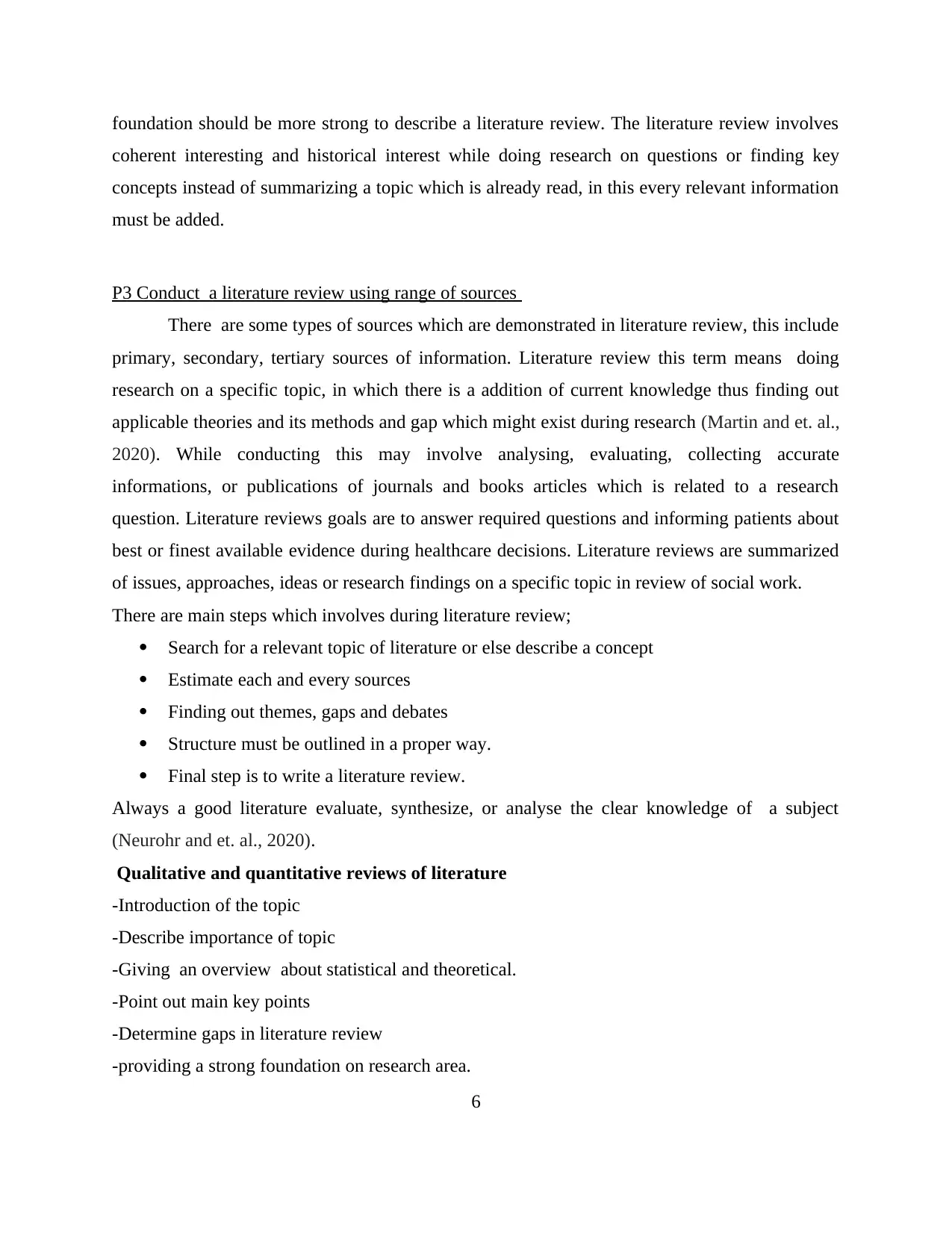
foundation should be more strong to describe a literature review. The literature review involves
coherent interesting and historical interest while doing research on questions or finding key
concepts instead of summarizing a topic which is already read, in this every relevant information
must be added.
P3 Conduct a literature review using range of sources
There are some types of sources which are demonstrated in literature review, this include
primary, secondary, tertiary sources of information. Literature review this term means doing
research on a specific topic, in which there is a addition of current knowledge thus finding out
applicable theories and its methods and gap which might exist during research (Martin and et. al.,
2020). While conducting this may involve analysing, evaluating, collecting accurate
informations, or publications of journals and books articles which is related to a research
question. Literature reviews goals are to answer required questions and informing patients about
best or finest available evidence during healthcare decisions. Literature reviews are summarized
of issues, approaches, ideas or research findings on a specific topic in review of social work.
There are main steps which involves during literature review;
Search for a relevant topic of literature or else describe a concept
Estimate each and every sources
Finding out themes, gaps and debates
Structure must be outlined in a proper way.
Final step is to write a literature review.
Always a good literature evaluate, synthesize, or analyse the clear knowledge of a subject
(Neurohr and et. al., 2020).
Qualitative and quantitative reviews of literature
-Introduction of the topic
-Describe importance of topic
-Giving an overview about statistical and theoretical.
-Point out main key points
-Determine gaps in literature review
-providing a strong foundation on research area.
6
coherent interesting and historical interest while doing research on questions or finding key
concepts instead of summarizing a topic which is already read, in this every relevant information
must be added.
P3 Conduct a literature review using range of sources
There are some types of sources which are demonstrated in literature review, this include
primary, secondary, tertiary sources of information. Literature review this term means doing
research on a specific topic, in which there is a addition of current knowledge thus finding out
applicable theories and its methods and gap which might exist during research (Martin and et. al.,
2020). While conducting this may involve analysing, evaluating, collecting accurate
informations, or publications of journals and books articles which is related to a research
question. Literature reviews goals are to answer required questions and informing patients about
best or finest available evidence during healthcare decisions. Literature reviews are summarized
of issues, approaches, ideas or research findings on a specific topic in review of social work.
There are main steps which involves during literature review;
Search for a relevant topic of literature or else describe a concept
Estimate each and every sources
Finding out themes, gaps and debates
Structure must be outlined in a proper way.
Final step is to write a literature review.
Always a good literature evaluate, synthesize, or analyse the clear knowledge of a subject
(Neurohr and et. al., 2020).
Qualitative and quantitative reviews of literature
-Introduction of the topic
-Describe importance of topic
-Giving an overview about statistical and theoretical.
-Point out main key points
-Determine gaps in literature review
-providing a strong foundation on research area.
6
⊘ This is a preview!⊘
Do you want full access?
Subscribe today to unlock all pages.

Trusted by 1+ million students worldwide
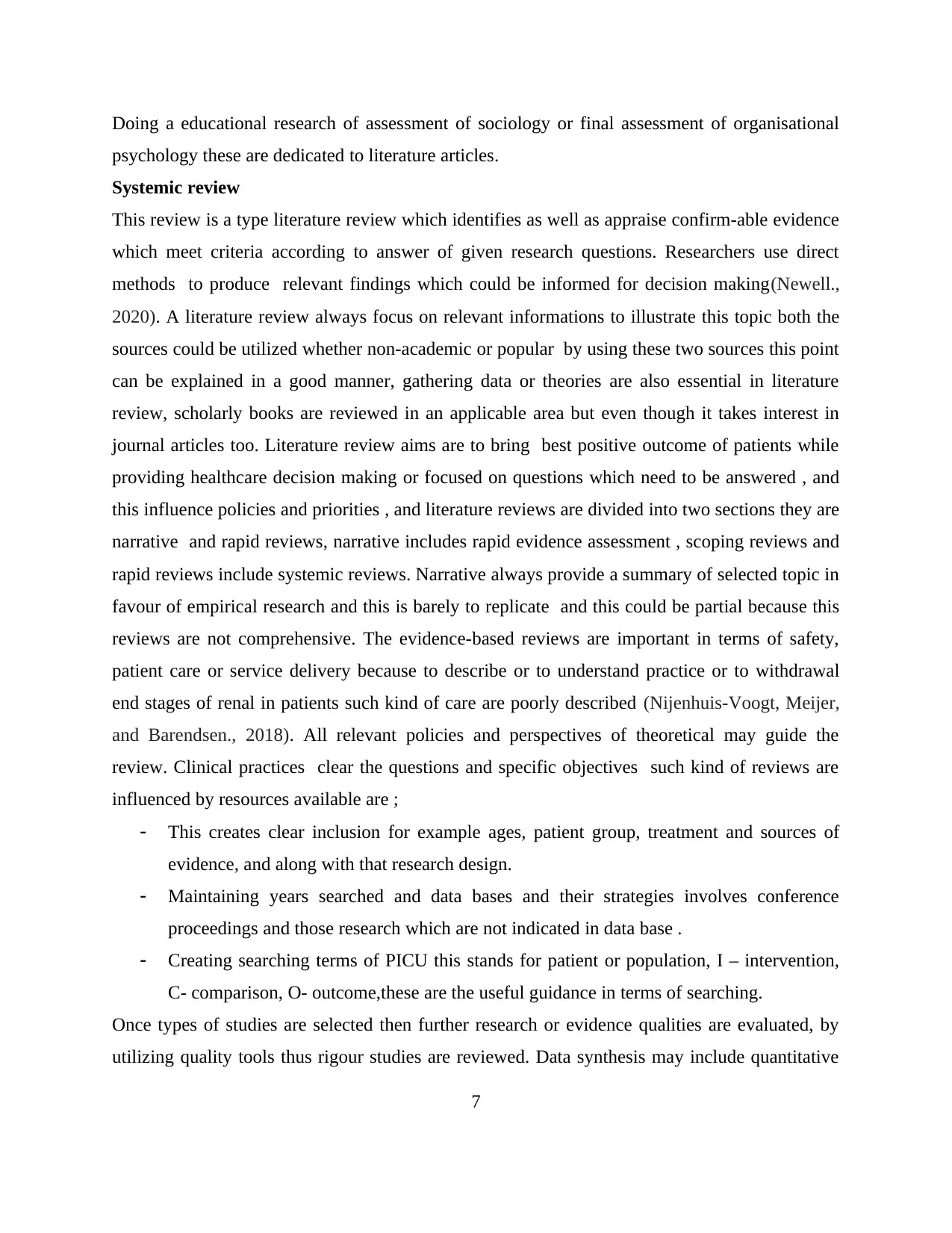
Doing a educational research of assessment of sociology or final assessment of organisational
psychology these are dedicated to literature articles.
Systemic review
This review is a type literature review which identifies as well as appraise confirm-able evidence
which meet criteria according to answer of given research questions. Researchers use direct
methods to produce relevant findings which could be informed for decision making(Newell.,
2020). A literature review always focus on relevant informations to illustrate this topic both the
sources could be utilized whether non-academic or popular by using these two sources this point
can be explained in a good manner, gathering data or theories are also essential in literature
review, scholarly books are reviewed in an applicable area but even though it takes interest in
journal articles too. Literature review aims are to bring best positive outcome of patients while
providing healthcare decision making or focused on questions which need to be answered , and
this influence policies and priorities , and literature reviews are divided into two sections they are
narrative and rapid reviews, narrative includes rapid evidence assessment , scoping reviews and
rapid reviews include systemic reviews. Narrative always provide a summary of selected topic in
favour of empirical research and this is barely to replicate and this could be partial because this
reviews are not comprehensive. The evidence-based reviews are important in terms of safety,
patient care or service delivery because to describe or to understand practice or to withdrawal
end stages of renal in patients such kind of care are poorly described (Nijenhuis-Voogt, Meijer,
and Barendsen., 2018). All relevant policies and perspectives of theoretical may guide the
review. Clinical practices clear the questions and specific objectives such kind of reviews are
influenced by resources available are ;
This creates clear inclusion for example ages, patient group, treatment and sources of
evidence, and along with that research design.
Maintaining years searched and data bases and their strategies involves conference
proceedings and those research which are not indicated in data base .
Creating searching terms of PICU this stands for patient or population, I – intervention,
C- comparison, O- outcome,these are the useful guidance in terms of searching.
Once types of studies are selected then further research or evidence qualities are evaluated, by
utilizing quality tools thus rigour studies are reviewed. Data synthesis may include quantitative
7
psychology these are dedicated to literature articles.
Systemic review
This review is a type literature review which identifies as well as appraise confirm-able evidence
which meet criteria according to answer of given research questions. Researchers use direct
methods to produce relevant findings which could be informed for decision making(Newell.,
2020). A literature review always focus on relevant informations to illustrate this topic both the
sources could be utilized whether non-academic or popular by using these two sources this point
can be explained in a good manner, gathering data or theories are also essential in literature
review, scholarly books are reviewed in an applicable area but even though it takes interest in
journal articles too. Literature review aims are to bring best positive outcome of patients while
providing healthcare decision making or focused on questions which need to be answered , and
this influence policies and priorities , and literature reviews are divided into two sections they are
narrative and rapid reviews, narrative includes rapid evidence assessment , scoping reviews and
rapid reviews include systemic reviews. Narrative always provide a summary of selected topic in
favour of empirical research and this is barely to replicate and this could be partial because this
reviews are not comprehensive. The evidence-based reviews are important in terms of safety,
patient care or service delivery because to describe or to understand practice or to withdrawal
end stages of renal in patients such kind of care are poorly described (Nijenhuis-Voogt, Meijer,
and Barendsen., 2018). All relevant policies and perspectives of theoretical may guide the
review. Clinical practices clear the questions and specific objectives such kind of reviews are
influenced by resources available are ;
This creates clear inclusion for example ages, patient group, treatment and sources of
evidence, and along with that research design.
Maintaining years searched and data bases and their strategies involves conference
proceedings and those research which are not indicated in data base .
Creating searching terms of PICU this stands for patient or population, I – intervention,
C- comparison, O- outcome,these are the useful guidance in terms of searching.
Once types of studies are selected then further research or evidence qualities are evaluated, by
utilizing quality tools thus rigour studies are reviewed. Data synthesis may include quantitative
7
Paraphrase This Document
Need a fresh take? Get an instant paraphrase of this document with our AI Paraphraser
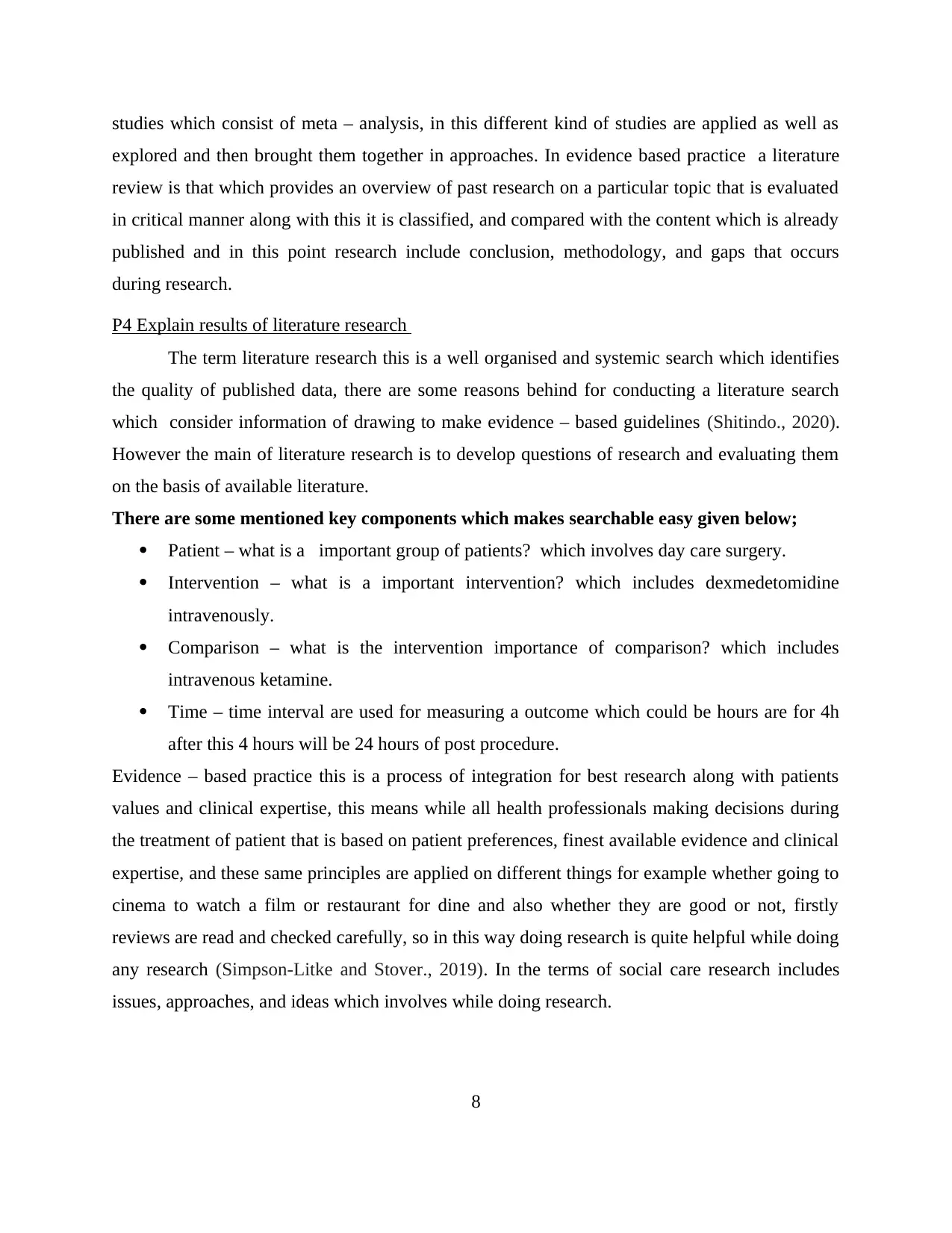
studies which consist of meta – analysis, in this different kind of studies are applied as well as
explored and then brought them together in approaches. In evidence based practice a literature
review is that which provides an overview of past research on a particular topic that is evaluated
in critical manner along with this it is classified, and compared with the content which is already
published and in this point research include conclusion, methodology, and gaps that occurs
during research.
P4 Explain results of literature research
The term literature research this is a well organised and systemic search which identifies
the quality of published data, there are some reasons behind for conducting a literature search
which consider information of drawing to make evidence – based guidelines (Shitindo., 2020).
However the main of literature research is to develop questions of research and evaluating them
on the basis of available literature.
There are some mentioned key components which makes searchable easy given below;
Patient – what is a important group of patients? which involves day care surgery.
Intervention – what is a important intervention? which includes dexmedetomidine
intravenously.
Comparison – what is the intervention importance of comparison? which includes
intravenous ketamine.
Time – time interval are used for measuring a outcome which could be hours are for 4h
after this 4 hours will be 24 hours of post procedure.
Evidence – based practice this is a process of integration for best research along with patients
values and clinical expertise, this means while all health professionals making decisions during
the treatment of patient that is based on patient preferences, finest available evidence and clinical
expertise, and these same principles are applied on different things for example whether going to
cinema to watch a film or restaurant for dine and also whether they are good or not, firstly
reviews are read and checked carefully, so in this way doing research is quite helpful while doing
any research (Simpson-Litke and Stover., 2019). In the terms of social care research includes
issues, approaches, and ideas which involves while doing research.
8
explored and then brought them together in approaches. In evidence based practice a literature
review is that which provides an overview of past research on a particular topic that is evaluated
in critical manner along with this it is classified, and compared with the content which is already
published and in this point research include conclusion, methodology, and gaps that occurs
during research.
P4 Explain results of literature research
The term literature research this is a well organised and systemic search which identifies
the quality of published data, there are some reasons behind for conducting a literature search
which consider information of drawing to make evidence – based guidelines (Shitindo., 2020).
However the main of literature research is to develop questions of research and evaluating them
on the basis of available literature.
There are some mentioned key components which makes searchable easy given below;
Patient – what is a important group of patients? which involves day care surgery.
Intervention – what is a important intervention? which includes dexmedetomidine
intravenously.
Comparison – what is the intervention importance of comparison? which includes
intravenous ketamine.
Time – time interval are used for measuring a outcome which could be hours are for 4h
after this 4 hours will be 24 hours of post procedure.
Evidence – based practice this is a process of integration for best research along with patients
values and clinical expertise, this means while all health professionals making decisions during
the treatment of patient that is based on patient preferences, finest available evidence and clinical
expertise, and these same principles are applied on different things for example whether going to
cinema to watch a film or restaurant for dine and also whether they are good or not, firstly
reviews are read and checked carefully, so in this way doing research is quite helpful while doing
any research (Simpson-Litke and Stover., 2019). In the terms of social care research includes
issues, approaches, and ideas which involves while doing research.
8
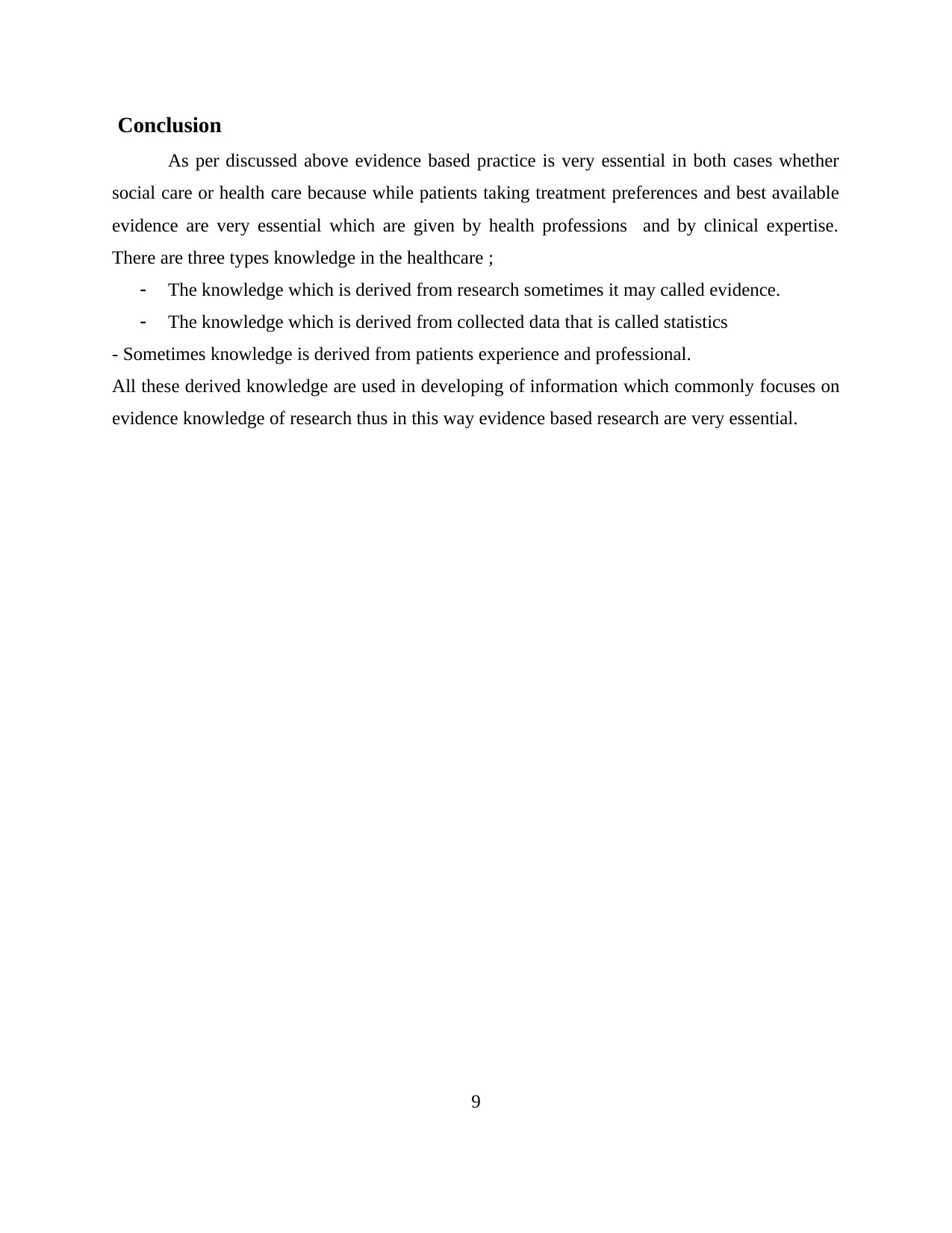
Conclusion
As per discussed above evidence based practice is very essential in both cases whether
social care or health care because while patients taking treatment preferences and best available
evidence are very essential which are given by health professions and by clinical expertise.
There are three types knowledge in the healthcare ;
The knowledge which is derived from research sometimes it may called evidence.
The knowledge which is derived from collected data that is called statistics
- Sometimes knowledge is derived from patients experience and professional.
All these derived knowledge are used in developing of information which commonly focuses on
evidence knowledge of research thus in this way evidence based research are very essential.
9
As per discussed above evidence based practice is very essential in both cases whether
social care or health care because while patients taking treatment preferences and best available
evidence are very essential which are given by health professions and by clinical expertise.
There are three types knowledge in the healthcare ;
The knowledge which is derived from research sometimes it may called evidence.
The knowledge which is derived from collected data that is called statistics
- Sometimes knowledge is derived from patients experience and professional.
All these derived knowledge are used in developing of information which commonly focuses on
evidence knowledge of research thus in this way evidence based research are very essential.
9
⊘ This is a preview!⊘
Do you want full access?
Subscribe today to unlock all pages.

Trusted by 1+ million students worldwide
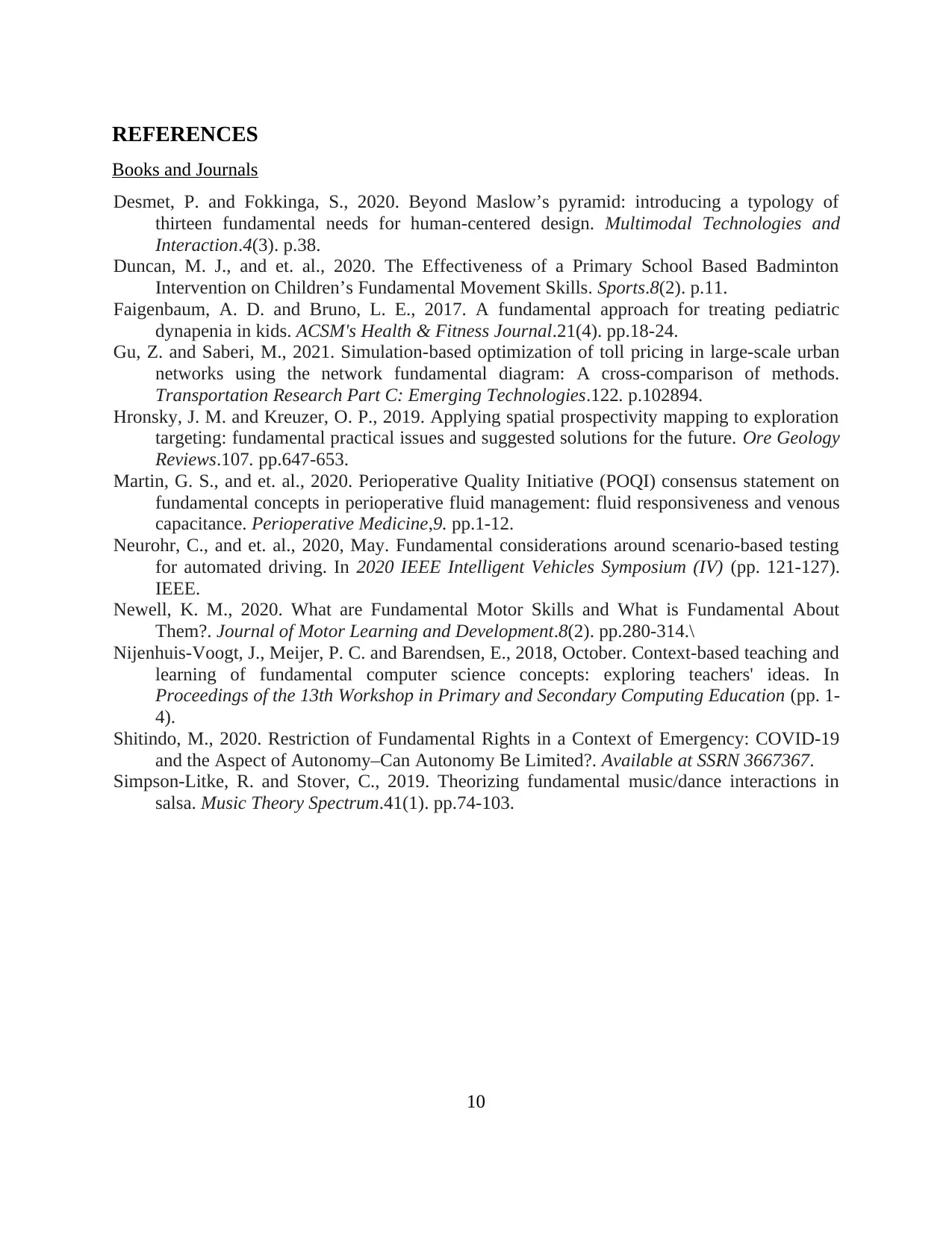
REFERENCES
Books and Journals
Desmet, P. and Fokkinga, S., 2020. Beyond Maslow’s pyramid: introducing a typology of
thirteen fundamental needs for human-centered design. Multimodal Technologies and
Interaction.4(3). p.38.
Duncan, M. J., and et. al., 2020. The Effectiveness of a Primary School Based Badminton
Intervention on Children’s Fundamental Movement Skills. Sports.8(2). p.11.
Faigenbaum, A. D. and Bruno, L. E., 2017. A fundamental approach for treating pediatric
dynapenia in kids. ACSM's Health & Fitness Journal.21(4). pp.18-24.
Gu, Z. and Saberi, M., 2021. Simulation-based optimization of toll pricing in large-scale urban
networks using the network fundamental diagram: A cross-comparison of methods.
Transportation Research Part C: Emerging Technologies.122. p.102894.
Hronsky, J. M. and Kreuzer, O. P., 2019. Applying spatial prospectivity mapping to exploration
targeting: fundamental practical issues and suggested solutions for the future. Ore Geology
Reviews.107. pp.647-653.
Martin, G. S., and et. al., 2020. Perioperative Quality Initiative (POQI) consensus statement on
fundamental concepts in perioperative fluid management: fluid responsiveness and venous
capacitance. Perioperative Medicine,9. pp.1-12.
Neurohr, C., and et. al., 2020, May. Fundamental considerations around scenario-based testing
for automated driving. In 2020 IEEE Intelligent Vehicles Symposium (IV) (pp. 121-127).
IEEE.
Newell, K. M., 2020. What are Fundamental Motor Skills and What is Fundamental About
Them?. Journal of Motor Learning and Development.8(2). pp.280-314.\
Nijenhuis-Voogt, J., Meijer, P. C. and Barendsen, E., 2018, October. Context-based teaching and
learning of fundamental computer science concepts: exploring teachers' ideas. In
Proceedings of the 13th Workshop in Primary and Secondary Computing Education (pp. 1-
4).
Shitindo, M., 2020. Restriction of Fundamental Rights in a Context of Emergency: COVID-19
and the Aspect of Autonomy–Can Autonomy Be Limited?. Available at SSRN 3667367.
Simpson-Litke, R. and Stover, C., 2019. Theorizing fundamental music/dance interactions in
salsa. Music Theory Spectrum.41(1). pp.74-103.
10
Books and Journals
Desmet, P. and Fokkinga, S., 2020. Beyond Maslow’s pyramid: introducing a typology of
thirteen fundamental needs for human-centered design. Multimodal Technologies and
Interaction.4(3). p.38.
Duncan, M. J., and et. al., 2020. The Effectiveness of a Primary School Based Badminton
Intervention on Children’s Fundamental Movement Skills. Sports.8(2). p.11.
Faigenbaum, A. D. and Bruno, L. E., 2017. A fundamental approach for treating pediatric
dynapenia in kids. ACSM's Health & Fitness Journal.21(4). pp.18-24.
Gu, Z. and Saberi, M., 2021. Simulation-based optimization of toll pricing in large-scale urban
networks using the network fundamental diagram: A cross-comparison of methods.
Transportation Research Part C: Emerging Technologies.122. p.102894.
Hronsky, J. M. and Kreuzer, O. P., 2019. Applying spatial prospectivity mapping to exploration
targeting: fundamental practical issues and suggested solutions for the future. Ore Geology
Reviews.107. pp.647-653.
Martin, G. S., and et. al., 2020. Perioperative Quality Initiative (POQI) consensus statement on
fundamental concepts in perioperative fluid management: fluid responsiveness and venous
capacitance. Perioperative Medicine,9. pp.1-12.
Neurohr, C., and et. al., 2020, May. Fundamental considerations around scenario-based testing
for automated driving. In 2020 IEEE Intelligent Vehicles Symposium (IV) (pp. 121-127).
IEEE.
Newell, K. M., 2020. What are Fundamental Motor Skills and What is Fundamental About
Them?. Journal of Motor Learning and Development.8(2). pp.280-314.\
Nijenhuis-Voogt, J., Meijer, P. C. and Barendsen, E., 2018, October. Context-based teaching and
learning of fundamental computer science concepts: exploring teachers' ideas. In
Proceedings of the 13th Workshop in Primary and Secondary Computing Education (pp. 1-
4).
Shitindo, M., 2020. Restriction of Fundamental Rights in a Context of Emergency: COVID-19
and the Aspect of Autonomy–Can Autonomy Be Limited?. Available at SSRN 3667367.
Simpson-Litke, R. and Stover, C., 2019. Theorizing fundamental music/dance interactions in
salsa. Music Theory Spectrum.41(1). pp.74-103.
10
1 out of 10
Related Documents
Your All-in-One AI-Powered Toolkit for Academic Success.
+13062052269
info@desklib.com
Available 24*7 on WhatsApp / Email
![[object Object]](/_next/static/media/star-bottom.7253800d.svg)
Unlock your academic potential
Copyright © 2020–2026 A2Z Services. All Rights Reserved. Developed and managed by ZUCOL.



